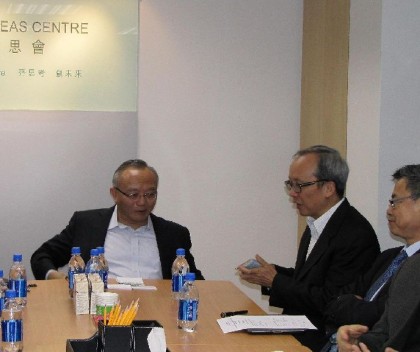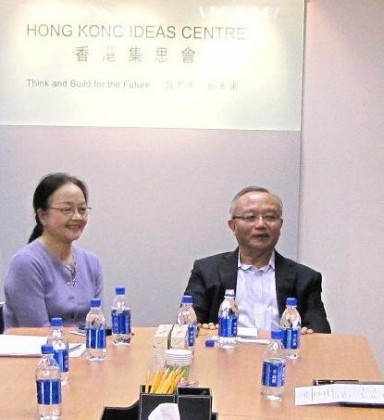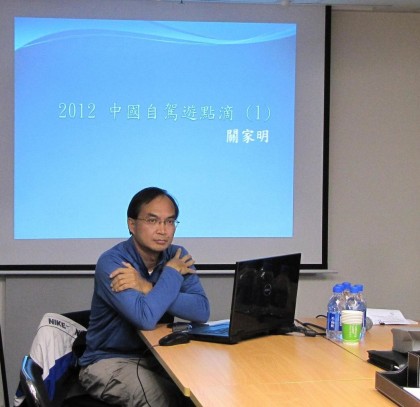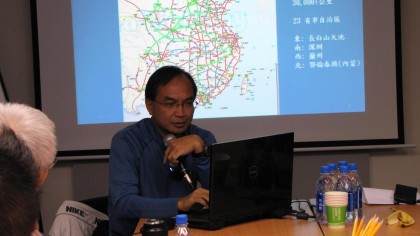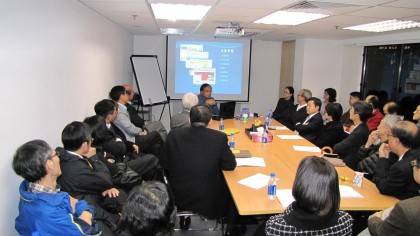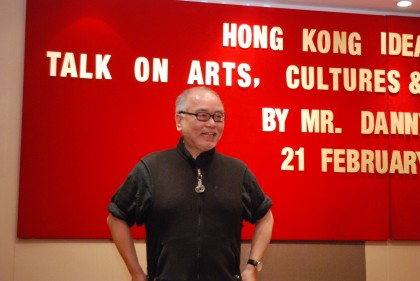2012.12.12 Talk on Problems in Building a Governing Coalition in Hong Kong
Speaker: Professor Lau Siu-kai
The governance of the new SAR administration has recently been subject to challenges. To understand the reasons behind the mounting tension between the administration and the public, HKIC organized a talk on the subject and invited Prof Lau Siu-kai, former Head of the Central Policy Unit, to comment on the present political scene.
This tough situation, as the ex-think tank chief delineated, is a combination of various factors. On the one hand, the society has become increasingly divided in the absence of a restored public consensus, and as one would expect, the administration has appeared to be incapable of drumming up public support for its initiatives. Prof Lau also singled out the non-existence of a ruling party as well as the failure of different pro-establishment parties in cooperating with each other, which have contributed to the weakening governing force.
To remedy the situation, Prof Lau put forward the idea of ‘coalition government’. The coalition should, he continued, not only include the pro-Beijing camp but also moderate elites such as the middle-class and professionals. As Prof Lau believes, the formation of a large and stable alliance serves multiple benefits: acts as a hub for political talents, aggregates different interests of the community, and facilitates effective governance.
2012.12.5 Self-drive tours in the Mainland
Speaker: Mr Nicholas Kwan
Self-drive tours across the Mainland have been popular among Hong Kong holidaymakers in recent years. Speaking to some 42 participants at a HKIC talk, Mr Nicholas Kwan, former Head of Research of the Standard Chartered Bank, shared the experience of his latest self-drive tours in the Mainland, and offered his views on the country’s present and future development.
Mr Kwan and his family’s self-drive journey lasts for 6 months, reaching 23 provinces and cities and travelling up to 30,000 kilometres in the Mainland. The expedition to the Mainland deepened his feelings about the country’s rapid urban development. While he realized that the country’s strength has remarkably enhanced, he also recognized that economic growth had exposed to serious corruption. Mr Kwan also experienced high degree of urban and rural disparity as well as geo-cultural multiplicity, which led him to conclude that there is not one but many ‘Chinas’ in the Mainland.
2012.10.10 Corporate Communications and Public Engagement in the Context of Urban Renewal in Hong Kong
Speaker: Mr Lawrence Yau
Urban renewal inevitably affects the interests of different stakeholders. But how to achieve a balance between urban renewal and the community’s aspirations for preserving historical buildings and maintaining social networks needs to be addressed. Speaking to some 60 participants at a HKIC talk, Mr Lawrence Yau, Director of Corporate Communications at Urban Renewal Authority (URA), shared URA’s strategic approach to engage members of the public. Citing the example of the Urban Renewal Strategy Review (2008-2010), Mr Yau indicated that the ‘traditional technocrat-driven consultation can no longer survive nowadays’ political reality.’ In view of the rising public awareness, Mr Yau suggested that stakeholders, citizens and communities should be involved at the earliest possible stage of policy development. This engagement strategy, as he reckons, provides opportunities for policymakers to identify community perceptions and needs. More importantly, it serves to promote agreement between policymakers and stakeholders in negotiation.
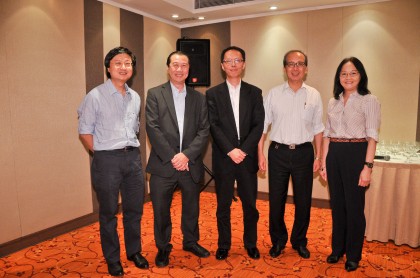
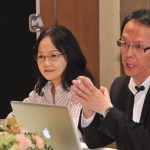
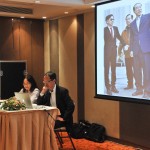
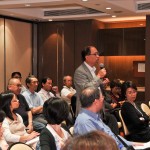
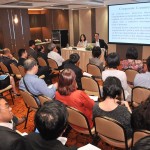
~~~~~~~~~~~~~~~~~~~~~~~~~~~~~~~~~~~~~~~~
2012.10.4 Hong Kong as the City of Choice for World Talents
Speaker: Mr Thomas Sevcik
Is Hong Kong a city of choice for world talents? Mr Thomas Sevcik, speaking to some 80 participants at a seminar jointly organised by HKIC, HKU SPACE Alumni, and HKU SPACE Centre for International Degree Programmes offered a positive answer. ‘The city’s diversity has given Hong Kong an edge in attracting and retaining world-class talents,’ said the co-founder and Co-CEO of the acclaimed creative think-tank Arthesia. But as global cities are competing for talents, Hong Kong needs to better differentiate itself from other competitors. The differentiation hinges upon Hong Kong’s ability to preserve its diversity and to sharpen its focus on the talent hunt. As Mr Sevcik advocated, ‘Hong Kong is not for beginners, but more experienced and the ‘know-what’ type of talents.’
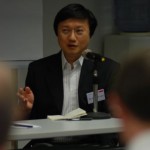
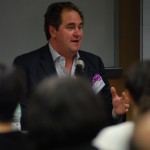
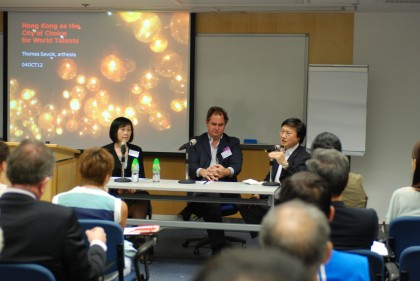
~~~~~~~~~~~~~~~~~~~~~~~~~~~~~~~~~~~~~~~~
2012.9.25 From Diaoyu Islands Dispute to Containment Strategy: Current Challenges of China’s National Defense
Speaker: Mr Mo Sik-keung Gilbert
Sino-Japanese relations have been gaining international attention as the sovereignty dispute over the Diaoyu Islands continues to heat up. HKIC invited Mr Mo Sik-keung Gilbert, an experienced lawyer and seasoned researcher of military affairs, to address the territorial dispute as well as challenges of China’s national defense. Speaking to about 60 participants from various sectors, Mr Mo anticipated that a major China-Japan military conflict seems improbable, albeit United States plays a dominant role in either escalating or easing the tensions between the two countries.
Mr Mo indicated several challenges facing China’s national defense, including insufficient modernised weaponry, unfavourable security environment, serious corruptions within the country, excessive expectations of the public on the national military power, and insufficient military experience of the army.
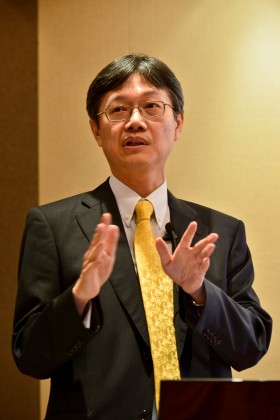
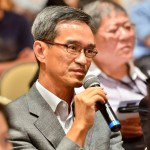
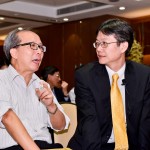
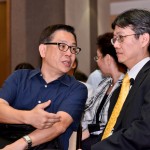
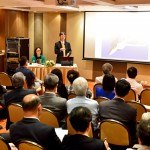
~~~~~~~~~~~~~~~~~~~~~~~~~~~~~~~~~~~~~~~~
2012.9.24 An Analysis of the New Political and Economic Situations in Hong Kong
Speaker: Mr Cheung Chi-kong
A total of about 1.8 million registered geographical constituency electors cast their votes in the 2012 Legislative Council (LegCo) Election, representing a record-high turnout rate of 53%. At the invitation of HKIC, Mr. Cheung Chi-kong, Executive Director of the One Country Two Systems Research Institute and Member of the Executive Council of the HKSAR Government, gave a talk to over 40 participants and offered his views on Hong Kong’s latest political and economic situations.
Mr Cheung considered that the disunity of the pro-establishment parties, the inability of the government to mobilise public support and the insufficiency in social cohesion have all shaped a tough politico-economic environment for the new Chief Executive Leung Chun-ying. Yet, he reckoned that the executive-led administration system, as well as the pro-government majority in LegCo, can be a strong stabilising force such that there is, as he sees, no systemic crisis in governance at present.


~~~~~~~~~~~~~~~~~~~~~~~~~~~~~~~~~~~~~~~~
16.8.2012 Principal Officials Accountability System: Problems and Challenges
Speaker: Professor Frederick Ma
On Aug 16, HKIC organised an evening talk and invited Professor Frederick Ma, former Secretary for Financial Service and the Treasury of the HKSAR Government, to address the topic of ‘Principal Officials Accountability System’ (POAS). The occasion attracted a full-house of nearly 100 former government officials, professionals and business executives from various sectors.
Professor Ma remarked that the POAS, introduced by the former Chief Executive Tung Chee-hwa, has bolstered the public perception that a principal official would voluntarily resign to take political responsibility for anything. But as Professor Ma sees, political accountability entails a range of disciplinary actions of which dismissal is only the last option. He urged that the term ‘political accountability’ should be clearly demarcated and made known to the public. He also held the view that a principal official should step down if his/her personal integrity negatively and considerably affects government popularity, or if he/she implements unwelcome policies or encounters policy failures.
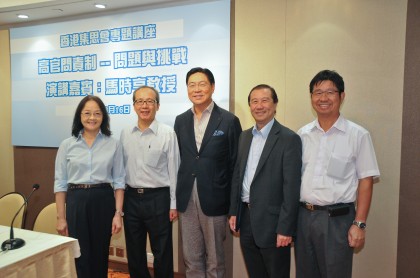










~~~~~~~~~~~~~~~~~~~~~~~~~~~~~~~~~~~~~~~~
2012.7.11 Offshore RMB Development under China’s Capital Account Liberalisation: Opportunities for Hong Kong
Speakers: Dr Huang Haizhou, Mr Tse Kwok Leung
To celebrate the establishment of the Hong Kong SAR, the central government announced 39 initiatives aimed at boosting the economic ties, among which 14 are to deepen the financial cooperation between Hong Kong and the Mainland. At the invitation of HKIC, Dr Huang Haizhou, Managing Director of the China International Capital Corporation Ltd, and Mr Tse Kwok Leung, Head of Economic Research Division of Bank of China (Hong Kong) Ltd. attended a panel discussion and offered their views on the implications of these initiatives on the development of Hong Kong’s offshore RMB centre.
Speaking to some 30 participants, Mr Tse commented that the new initiatives have a limited role on the development of Hong Kong’s offshore RMB centre because the centre has in itself encountered a bottleneck since the beginning of 2012. The development bottleneck is, as he explained, a result of slowdown in RMB deposit growth, unattractiveness of RMB products, intensified competitions from London and Taiwan on offshore RMB business, and the commencement of the interest rate reduction cycle in the Mainland.
The other panellist, Dr Huang, holds an optimistic view on the development of Hong Kong’s offshore RMB centre. He anticipated that the Mainland will expedite RMB internationalisation to achieve full convertibility in the next 3 to 5 years. In other words, Hong Kong has a window of opportunity of 3 to 5 years to establish itself as the centre of RMB bond issuance, RMB asset management, and RMB foreign exchange trading. On the direction for future development, Dr Huang recommended the use of official channels to strive for more RMB deposits and clearing business from international financial institutions such as IMF and BIS.




~~~~~~~~~~~~~~~~~~~~~~~~~~~~~~~~~~~~~~~~
24.4.2012 Capital Account Liberalization in China and its Implications for Capital Flows and the RMB Exchange Rate
Speaker: Dr Dong HE
At the invitation of HKIC, Dr Dong HE, Executive Director (Research) of the Hong Kong Monetary Authority and Director of the Hong Kong Institute for Monetary Research, gave a talk to over 60 participants on China’s progress in the liberalization of capital account and its implications for capital flows and the RMB exchange rate. He anticipated that China will quicken the pace of capital account liberalization in the decade ahead, but the process is likely to be managed very carefully, so as to minimize risks to financial stability. The approach will then be one of incremental steps than quantum leap.
Dr He also expected that China’s capital account liberalization would lead to increased business for Hong Kong as an offshore RMB centre. However, he held the view that prospect for enhanced RMB liquidity in Hong Kong depends on Hong Kong’s ability to further strengthen its attractiveness as a centre for global financial institutions and for agglomeration of transactions in other major currencies.




~~~~~~~~~~~~~~~~~~~~~~~~~~~~~~~~~~~~~~~~
17.4.2012 Dim Sum Bond: The Recipe
Speaker: Mr Ernest Chow
Named after the popular Cantonese cuisine, Dim Sum Bonds refer to RMB-denominated bonds issued in Hong Kong. Despite its short history, the Dim Sum Bond market has experienced exponential growth. In 2007, only RMB10 billion worth of Dim Sum Bonds were issued, whereas in 2011 issuance soared to RMB152 billion. Mr Ernest Chow, HKIC’s Consultant and veteran banker with practical experience in the making of Dim Sum Bonds, shared with some 60 participants on the various origination and structuring challenges faced by the ‘chefs’ in the kitchen.
Mr Chow anticipates a flourishing offshore RMB market in Hong Kong, as benefited from the gradual development of the CNH HIBOR, and the announcement of the rules governing RMB investment in the Mainland (e.g. FDI, RQFII, etc.). To the Dim Sum Bond market, however, it would mean more competition from other RMB investment products, he said.
Participants raised concern about competition from Singapore and London who strive to establish their offshore RMB centre as the pace of RMB internationalisation accelerated. In order to out-compete these parties, Mr Chow suggested that more could be done on financial infrastructure and regulation to strengthen Hong Kong’s Dim Sum Bond market.
Presentation




~~~~~~~~~~~~~~~~~~~~~~~~~~~~~~~~~~~~~~~~
12.3.2012 OECD Programme for International Student Assessment (PISA)
Speaker: Prof. Esther Sui-chu Ho
Results on standardized tests have become a common way to evaluate student performance and the effectiveness of the education system in different countries/regions. One of these well-known tests is the Programme for International Student Assessment (PISA) coordinated by the Organization for Economic Co-operation and Development (OECD). HKIC has invited Prof. Esther Ho, Director of the Hong Kong Centre for PISA and Professor of Department of Educational Administration Policy, to introduce and analyze the key findings of PISA, and to discuss their implications on the effectiveness and efficiency of the new education reform launched in 2000.
In terms of overall quality, Hong Kong students continued to perform well in the three assessment domains including Reading, Mathematics and Science, and their mean performances are significantly above the OECD averages. Prof. Ho pointed out that the good performance of Hong Kong students in PISA seems to validate that our education is heading in the right direction. However, compared to other top performing countries or regions, Hong Kong has fewer high achievers. She also observed that while Hong Kong students have reported a high level of use of memorization strategy, they do not frequently use the most effective control strategies. Prof. Ho suggested that educators and curriculum specialists should formulate action for the improvement of students’ ability to use effective reading strategies. In addition, a communitarian view of schooling should be promoted by means of parent education and teacher education, which helps support the all-round development of adolescents.




~~~~~~~~~~~~~~~~~~~~~~~~~~~~~~~~~~~~~~~~
28.2.2012 Mental Health in Hong Kong – Seriousness of Current Problems and Effectiveness of Public Policies
Speaker: Miss Deborah Wan
Projection figures of the World Health Organization (WHO) indicate that by 2030, depressive disorders will be the number one cause of disease in the world. However, there is a lack of preventive and promotion measures to tackle mental health problems in different countries/regions. Hong Kong is no exception. HKIC invited Miss Deborah Wan, President of the World Federation for Mental Health, to address the seriousness of current mental health problems and to analyse the effectiveness of mental health policies in Hong Kong.
Speaking to 26 participants, Miss Wan stressed that advocacy for mental health is a priority, and the implementation of mental health policy is crucial for achieving health for all because, as she said, ‘there would be no health without mental health’. She urged that a commission on mental health, which is responsible for the co-ordination of mental health policies and services for the adolescents, adults and elderly, should be set up in Hong Kong.
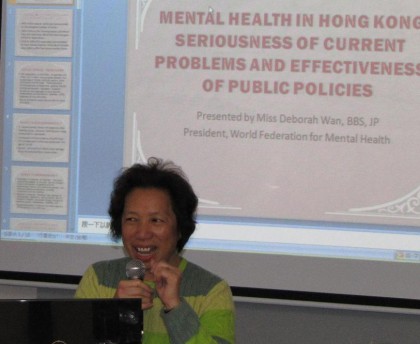


~~~~~~~~~~~~~~~~~~~~~~~~~~~~~~~~~~~~~~~~
21.2.2012 Talk on Arts, Cultures & Creative Industries
Speaker: Mr. Danny Yung
In recent years, the international community has increasingly recognised the important roles of culture and creative economy, and its significant contributions to a society’s sustainable development. In Hong Kong, the West Kowloon Cultural District (WKCD) project is one of the strategic investments to support the arts and cultural development. HKIC has invited Mr. Danny Yung, Founder and Co-Artistic Director of Zuni Icosahedron, Chairman of the Hong Kong Institute of Contemporary Culture, and member of the Board of Directors of the WKCD Authority, to share his views and insights on the development of arts, cultural and creative industries. The talk was attended by more than 100 participants from various sectors.
While the public tends to perceive cultural activities as a form of entertainment or a business/education publicity, Mr Yung sees that cultural activities perform many social functions: they foster social cohesion, promote an open society, and construct public space/discourse. If all these functions are to be realised, cultural projects need long term planning and careful implementation. However, Mr Yung criticised that there is a lack of comprehensive blueprint for the development of cultural and creative industries in Hong Kong. He offered some suggestions to remedy the situation: while the Government has to do more research on the arts, cultural and creative industries, it also has to facilitate stronger connections and encourage ‘cross-overs’ among different sectors of the industries.
 ()
() 